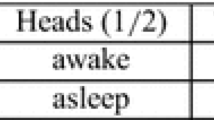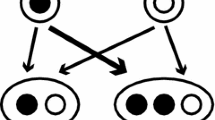Abstract
In two excellent recent papers, Jacob Ross has argued that the standard arguments for the ‘thirder’ answer to the Sleeping Beauty puzzle lead to violations of countable additivity. The problem is that most arguments for that answer generalise in awkward ways when he looks at the whole class of what he calls Sleeping Beauty problems. In this note I develop a new argument for the thirder answer that doesn't generalise in this way.
Similar content being viewed by others
Notes
I have some concerns about what ‘indistinguishable’ means in this context. We’ll come back to that issue a bit in what follows.
In Weatherson (2011) these are described as haecceities, but this is misleading at best. It is crucial that ‘Hesperus’ and ‘Phosphorus’ have different associations, but intuitively they have the same haecceity. Thinking of the associations as being with something like senses is better.
One might be tempted by a seemingly stronger argument. For instance, one could argue that on Wednesday, Beauty knows that the chance of H was 1/2, and she has no inadmissible evidence, so by the Principal Principle her credence in H should be 1/2. But it isn’t clear that she has no inadmissible evidence; perhaps the evidence she would express by thinking back to her last waking and saying That waking happened is inadmissible. Or one might be tempted by a Reflection Principle based argument against any alternative credence. But such arguments seem to lead to odd results in general around Sleeping Beauty. It’s best, I think, to stick with the clear intuition that on Wednesday her credence in H should be 1/2.
Strictly speaking, all we’ve really shown is that Beauty’s credences on the last day she wakes should satisfy Last Day. So if the focus of the puzzle is on her credences on the first day, all we’ve strictly speaking shown is that if H, then Last Day is true. I think it is plausible that Last Day should be independent of how the coin lands, but I admit that I don’t have an argument against someone who wants to dispute this.
References
Elga, A. (2000). Self-locating belief and the sleeping beauty problem. Analysis, 60, 143–147.
Halpern, J. (2004). Sleeping beauty reconsidered: Conditioning and reflection in asynchronous systems. In Gendler, T. S. & Hawthorne, J. (Eds.), Oxford studies in epistemology (Vol. 1, pp. 111–142). Oxford: Oxford University Press.
Jeshion, R. (2002). Acquaintanceless De Re belief’. In Campbell, J. K., O’Rourke, M. & Shier, D. (Eds.), Meaning and truth: Investigations in philosophical semantics (pp. 53–74). New York, NY: Seven Bridges Press.
Ross, J. (2010). Sleeping beauty, countable additivity, and rational dilemmas. Philosophical Review, 119(4), 411–447.
Ross, J. (2011). All roads lead to violations of countable additivity. Philosophical Studies. Published online 24 May 2011.
Stalnaker, R. (2008). Our knowledge of the internal world. Oxford: Oxford University Press.
Titlebaum, M. (2008). The relevance of self-locating beliefs. Philosophical Review, 117, 555–605.
Weatherson, B. (2011). Stalnaker on sleeping beauty. Philosophical Studies, 155(3), 445–456.
Weintraub, R. (2004). Sleeping beauty: A simple solution. Analysis, 64(1), 8–10.
Williamson, T. (2007). The philosophy of philosophy. Oxford: Blackwell Pub. Ltd.
Acknowledgments
Thanks to Jacob Ross and Sarah Moss for very helpful discussions about how to improve this paper.
Author information
Authors and Affiliations
Corresponding author
Rights and permissions
About this article
Cite this article
Weatherson, B. Ross on sleeping beauty. Philos Stud 163, 503–512 (2013). https://doi.org/10.1007/s11098-011-9827-x
Published:
Issue Date:
DOI: https://doi.org/10.1007/s11098-011-9827-x




